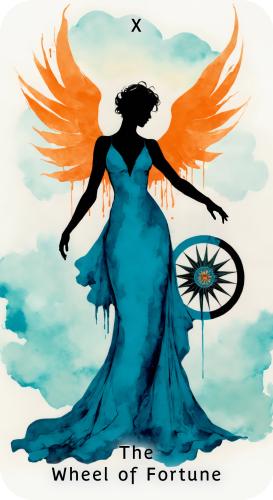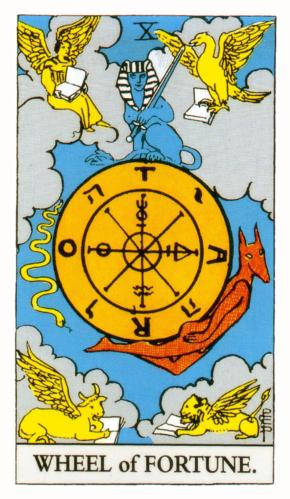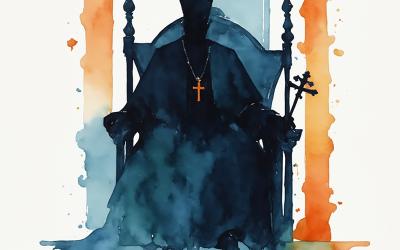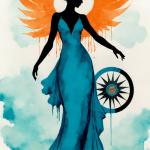Personal Reflections
If I had to pick one card that most perfectly captures the unpredictable nature of existence, The Wheel of Fortune would be it. There's something almost comical about how accurately it portrays life's tendency to shift just when we think we've got things sorted. One moment you're on top feeling pretty pleased with yourself, the next you're at the bottom wondering what the hell happened. And then, just as you've resigned yourself to your supposedly permanent position at the bottom, up you go again. The universe, it seems, has quite the sense of humour.
Throughout history, humans have tried to make sense of fortune's seemingly arbitrary nature. The ancient Greeks had their goddess Tyche, the Romans had Fortuna, both depicted with various symbols of chance and fate. Sometimes blindfolded (suggesting impartiality), sometimes with wings (indicating swiftness of change), sometimes with a rudder (hinting at some form of guidance behind apparent randomness). All these representations attempted to give form to a universal truth we all experience: nothing stays the same for long. Whether we like it or not, change is the only constant in this world, with the wheel perpetually turning whether we're prepared for it or not.
What makes the Wheel of Fortune especially interesting is how it challenges our notions of control. Us humans are quite fond of the illusion that we're in charge of our lives. We make plans, set goals, and generally assume that if we do A and B, then C will naturally follow. The Wheel laughs gently at such certainty. It reminds us that while we might choose how to play the cards we're dealt, we don't get to choose the cards themselves. This isn't fatalism – it's simply an acknowledgment that life operates in cycles that are larger than our individual will. The rising and falling figures on the traditional card aren't being punished or rewarded; they're simply experiencing different phases of an endless cycle that we all participate in.
When this card appears in readings, it often coincides with times of significant change in a person's life. The promotion you've been working towards finally comes through. The relationship you thought would last forever suddenly ends. The house you desperately wanted falls through, only for a better one to appear unexpectedly. These moments can feel random and chaotic when we're in them, but the Wheel suggests there might be patterns and rhythms if we step back far enough to see them. It's not about predicting what specific changes will come, but about developing a certain philosophical resilience towards change itself.
The reversed Wheel of Fortune often indicates resistance to these natural cycles. We've all been there – clinging desperately to circumstances that are clearly shifting, throwing good energy after bad to maintain the status quo, or perhaps trying to force changes that simply aren't ready to manifest. It's like trying to prevent the tide from coming in by building ever more elaborate sandcastles. The energy spent resisting inevitable change could often be better used adapting to it. The reversal doesn't mean bad luck so much as it suggests a misalignment with timing – fighting against currents that would carry us more easily if we'd simply adjust our course.
Perhaps what's most hopeful about the Wheel of Fortune is its promise that nothing is permanent – neither the good nor the bad. Having a terrible time? The Wheel will turn. Experiencing a golden period? Appreciate it fully, knowing that it too shall pass. There's a strange comfort in this impermanence. It liberates us from the pressure of trying to freeze our happiest moments in amber, and gives us courage during our darkest times. Not in a "look on the bright side" sort of way, but in the quiet knowledge that even the most difficult circumstances will eventually shift into something else.
The wisdom of the Wheel isn't about passively accepting whatever comes our way. Rather, it's about recognising which elements are within our influence and which aren't, then focusing our energy accordingly. We can't stop the seasons from changing, but we can choose suitable clothing. We can't prevent all difficulties, but we can develop resilience to weather them more gracefully. We can't make opportunity knock, but we can be ready to answer when it does. The true skill in working with the Wheel's energy is knowing when to act and when to wait, when to strive and when to surrender.
Symbolism
- The Wheel: Cycles of life, karma, the ups and downs of existence
- The Sphinx: Wisdom and riddles, the enigmatic nature of fate
- The Snake: Kundalini energy, wisdom gained through experience
- The Anubis figure: Guarding the underworld, cycles of death and rebirth
- The four figures in the corners: The four fixed signs of the zodiac (Aquarius, Scorpio, Leo, Taurus), representing stability amidst change
Historical Background
The Wheel of Fortune has been a consistent presence in tarot decks since their inception. Its imagery often draws from medieval concepts of Fortuna's Wheel, a symbol used to represent the capricious nature of fate. In many early decks, the wheel was depicted with human figures rising and falling, illustrating the ups and downs of fortune.
Pairings
- The Wheel of Fortune + The Tower: Sudden, unexpected changes that shake up the status quo
- The Wheel of Fortune + The Magician: Taking advantage of changing circumstances through personal action
- The Wheel of Fortune + The Hermit: A period of reflection or withdrawal during times of change
- The Wheel of Fortune + The Star: Hope and optimism during times of transition
Be Aware of...
- The querent's current life circumstances and their readiness for change
- Any patterns or cycles that may be repeating in the querent's life
- The querent's attitude towards change and their ability to adapt
- Potential opportunities that may be arising, even if they're not immediately apparent
- The temporary nature of both good and bad fortune
- The importance of timing and being prepared to act when opportunities present themselves
- The querent's belief in fate versus their sense of personal agency
Exercises and Meditations
- What cycles or patterns do I notice repeating in my life?
- How do I typically respond to unexpected changes? How might I improve my adaptability?
- What opportunities am I currently overlooking?
- How can I better prepare myself for the inevitable changes life brings?
- In what areas of my life do I need to let go and trust the process?
- How has a past experience of "bad luck" eventually led to positive outcomes?
- What can I learn from the current phase of my life's cycle?







